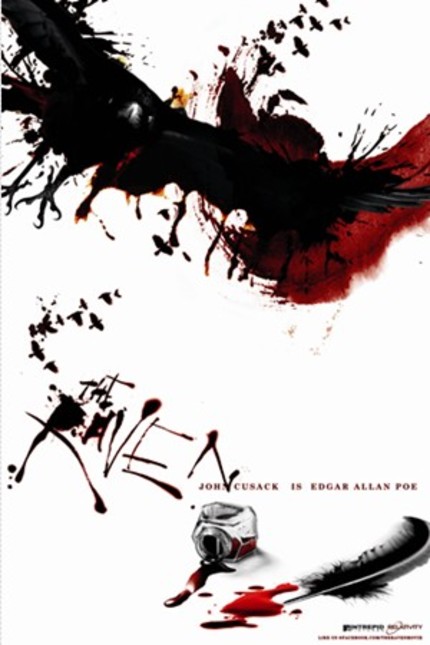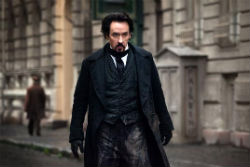Review: THE RAVEN Promises Poe, Delivers Cusack

Like slightly-cooled hot chocolate -- with John Cusack as a marshmallow Edgar Allan Poe -- The Raven goes down easy, warming the weary soul on a cold night, without leaving much of an aftertaste.
Directed by James McTeigue with the visual flair expected from the man who made V for Vendetta (as well as the liberal splashing of digital blood anticipated by the maker of Ninja Assassin), The Raven is set in Baltimore, Maryland, USA, during the mysterious last days of Edgar Allan Poe. It's no spoiler to say that the writer died in October 1849, since the movie states the fact in an opening title.
Since his cause of death is still disputed, however, The Raven transposes a familiar premise (borrowed in part from 1995's Copycat, but others as well), into the 19th century: A copycat serial killer takes inspiration from the literary works of Poe, who is then called upon to help solve the case by the open-minded Detective Fields (Luke Evans). Soon enough, Poe's beloved Emily Hamilton (Alice Eve), to whom he has recently proposed marriage over the objections of her wealthy business tycoon father (Brendan Gleeson), becomes a target.
The screenplay, credited to Ben Livingstone and Hannah Shakespeare, plays fast and loose with other facts, as known, about Poe's life, even while it pays specific homage to his stories and poems. When not quoting Poe, the dialogue is rich, ornate, and beautiful, which makes the irregular appearance of anachronistic language sound awkward and forced. (And improvised? It's hard to say, but the lapses stand out.)
Cusack makes for a witty and charming Poe, which may be part of the reason why The Raven does not cut as deeply or as sharply as needed to make a lasting impression. Despite facing abject poverty and dealing with a horrendous case of writer's block, Cusack's Poe looks well-fed and acts as though he's still supremely self-confident, proclaiming his literary superiority to one and all, whether a bar full of illiterate workingmen or the office of his newspaper editor. He's also achingly romantic with young Emily (a fictionalized version of the real-life Sarah Elmira Royster, who was a divorced woman of 38 with two children when Poe proposed to her; they had been teenagers in love).
 Is he bluffing? His editor tells Detective Fields that Poe has seen the loss of every love in his life, and Cusack plays him as a pensive, troubled soul. Yet he can't quite push the character to the edge of despair and desperation, as is called for in the story. It's too apparent that Cusack is acting as he thinks Poe would have acted, as opposed to creating his own characterization.
Is he bluffing? His editor tells Detective Fields that Poe has seen the loss of every love in his life, and Cusack plays him as a pensive, troubled soul. Yet he can't quite push the character to the edge of despair and desperation, as is called for in the story. It's too apparent that Cusack is acting as he thinks Poe would have acted, as opposed to creating his own characterization.
My point of reference on this is Jeffrey Combs' outstanding performance as Poe in a one-man show directed by Stuart Gordon that I saw at Fantastic Fest in 2010. Combs was magnificent as a tortured poet, making the character come alive in ways that Cusack can only hint at in The Raven. The Poe on display here is an approximation, rather than a detailed portrait of a man who is drowning on the verge of death.
Working on a more intimate scale than in the past, McTeigue reins in most of his tendencies toward excess. His evocations of "The Pit and the Pendulum" and "Premature Burial," to name two, are straightforward without being distinctive, which applies to the picture as a whole.
The Raven contains plenty of likable elements and makes a good-faith effort to honor the spirit of Edgar Allan Poe. Alas, like slightly-cooled hot chocolate with a big marshmallow, it won't keep you up at night.
The Raven opens wide across the U.S. and Canada today. Check local listings for theatres and showtimes.







